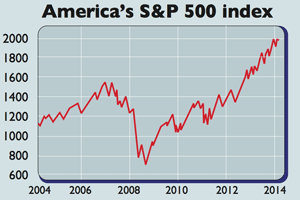Bulls to the fore in the S&P 500
Investors should be wary of rampant bullishness on Wall Street.

Get the latest financial news, insights and expert analysis from our award-winning MoneyWeek team, to help you understand what really matters when it comes to your finances.
You are now subscribed
Your newsletter sign-up was successful
Want to add more newsletters?

Twice daily
MoneyWeek
Get the latest financial news, insights and expert analysis from our award-winning MoneyWeek team, to help you understand what really matters when it comes to your finances.

Four times a week
Look After My Bills
Sign up to our free money-saving newsletter, filled with the latest news and expert advice to help you find the best tips and deals for managing your bills. Start saving today!
The bears "have gone into hibernation", say Alexandra Scaggs and Steven Russolillo in The Wall Street Journal. America's S&P 500 stock market index has hit a new record above 2,000.
The bull is based on "endless free money", as Randall Forsyth notes in Barron's all the world's major central banks have adopted zero-interest-rate policies, and this ample liquidity has allowed investors to ignore high US valuations, a weak global recovery, and ominous geopolitics.
Now, rather than worry about whether the market is due a breather, Wall Street is working on "a new rationale for optimism", says John Authers in the Financial Times.
MoneyWeek
Subscribe to MoneyWeek today and get your first six magazine issues absolutely FREE

Sign up to Money Morning
Don't miss the latest investment and personal finances news, market analysis, plus money-saving tips with our free twice-daily newsletter
Don't miss the latest investment and personal finances news, market analysis, plus money-saving tips with our free twice-daily newsletter
The bulls note that periods of rising rates have done equities no harm in the past ignoring the fact that this time the world economy is carrying an unprecedented level of debt. The bulls also point to a new note from Morgan Stanley arguing that the S&P could hit 3,000 in the next five years.
Morgan Stanley's point is that the global and US economic recoveries are likely to last for considerably longer than usual. The global economy "is out of sync, with countries in different stages of their cycle". So it is nowhere near overheating.

US households have cut debt as a share of disposable income from a peak of 135% to 108%, and consumer confidence has finally risen to levels seen in a normal recovery.
Companies have refinanced and cut their borrowing too, and so "remain far from" overstretched. Capital spending has only recently started to grow in earnest.
"As the prolonged expansion becomes more visible, we'd expect a materially higher US stock market" assuming that the recovery can avoid being derailed by a global crisis or a Washington-induced fiscal squeeze.
All the same, investors should be wary of rampant bullishness on Wall Street. When everyone agrees that stocks are going up, "it's dangerous", says Jim Cahn of the Wealth Enhancement Group."If they turn out to be wrong, everyone runs for the door at the same time."
Get the latest financial news, insights and expert analysis from our award-winning MoneyWeek team, to help you understand what really matters when it comes to your finances.

-
 Should you buy an active ETF?
Should you buy an active ETF?ETFs are often mischaracterised as passive products, but they can be a convenient way to add active management to your portfolio
-
 Power up your pension before 5 April – easy ways to save before the tax year end
Power up your pension before 5 April – easy ways to save before the tax year endWith the end of the tax year looming, pension savers currently have a window to review and maximise what’s going into their retirement funds – we look at how